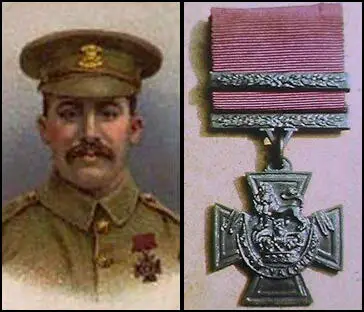William Fuller
William Fuller was born in Newbridge, Carmarthenshire on 24th March 1884. The family moved to Swansea when William was about four years old. He attended Rutland Street School and because of his reluctance to receive an education, the Swansea Truant School.
In 1902 Fuller joined the British Army and served in South Africa during the Boer War. He spent several years in India before leaving the army. As a reservist, he was recalled on the outbreak of the First World War and went to France with British Expeditionary Force in August 1914.
Fuller took part in the Battle of Mons. He was also part of an advance party led by Captain Mark Haggard, that came under fire from a German machine-gun post. Attempts to capture Maxim Gun resulted in Haggard being badly wounded. Fuller, at great risk to himself, carried Haggard until out of reach of the German guns.
Fuller later recalled: "On proceeding a little further we were faced by a Maxim Gun. There was a little wood on the top and a hedge about 50 yards long. It was not long before the men on Captain Haggard's left were both shot, and the man on the right was wounded. At the same time Captain Haggard was struck in the stomach, and he fell doubled, the shot coming out through his right side. Thus I was the only one uninjured. It became necessary for me to carry Captain Haggard back to cover. This was done by him putting his right arm around my neck, while I had my right arm under his legs and the left under his neck. Captain Haggard asked me to lift up his head so that he could see our big guns firing at the Germans as they were retiring from the wood."
William Fuller managed to get Haggard to a dressing station but he died the next day. Fuller's act of bravery resulted in him becoming the first Welshman in the First World War to win the Victoria Cross.

A few weeks later Fuller was shot in the neck at the Battle of Gheluvelt. Fuller was returned to England and was treated at Manchester Hospital. It was only after another operation at Swansea Hospital that the bullet was found. Fuller was judged to me unfit for military service and was invalided out of the British Army.
Fuller sold fish from a horse-drawn cart after leaving the army and became a well-known figure in Swansea. In 1938 he won the Royal Humane Society Medal for Lifesaving after rescuing two boys who had fallen into the sea. In the Second World War Fuller served as an air-raid warden in Swansea.
William Fuller died on 29th December 1974.
Primary Sources
(1) William Fuller was interviewed on 24th November, 1914, about his attempt to save the life of Captain Mark Haggard.
On proceeding a little further we were faced by a Maxim Gun. There was a little wood on the top and a hedge about 50 yards long. It was not long before the men on Captain Haggard's left were both shot, and the man on the right was wounded. At the same time Captain Haggard was struck in the stomach, and he fell doubled, the shot coming out through his right side. Thus I was the only one uninjured.
It became necessary for me to carry Captain Haggard back to cover. This was done by him putting his right arm around my neck, while I had my right arm under his legs and the left under his neck. Captain Haggard asked me to lift up his head so that he could see our big guns firing at the Germans as they were retiring from the wood.
(2) Rider Haggard, diary entry (18th September, 1914)
I have just heard over the telephone from my daughter that her brother-in-law, my nephew Mark Haggard, died of wounds on the 15th. It was a great shock as I was very fond of him. He was a good officer and a very gallant man. All honour to him who has died the "best and the greatest of deaths". But his poor young wife, whose marriage I attended not a year ago!
(3) Rider Haggard met William Fuller on 6th January 1915.
The study of the hero at home is rather amusing, for it appears in private life Fuller is interested in breeding canaries, and he has no yearning desire to return to mingle in the joy of battle. In short, he seems to have had enough of it, and informed me that his nerve is not what it was. He showed me his Victoria Cross, which he has just received from the King, in a little white cardboard box, but objected that they had put Corporal Fuller on the back of it, when at the time of Mark's rescue he was a Private.


